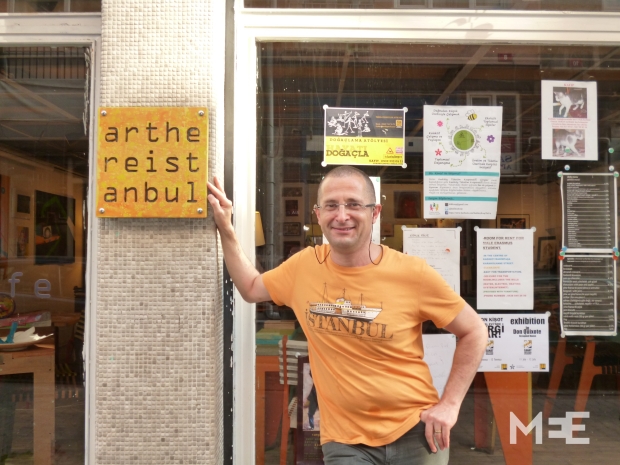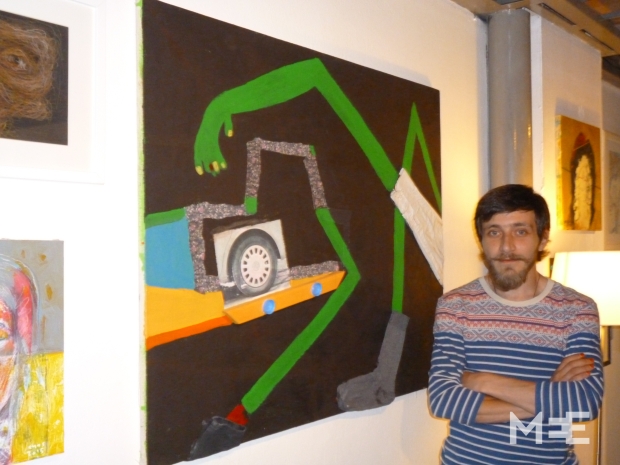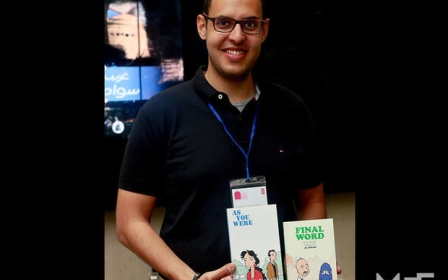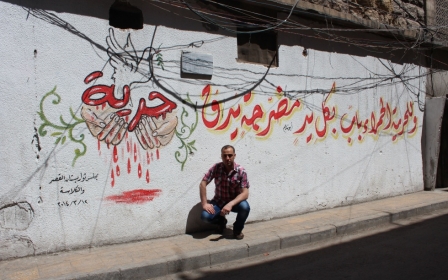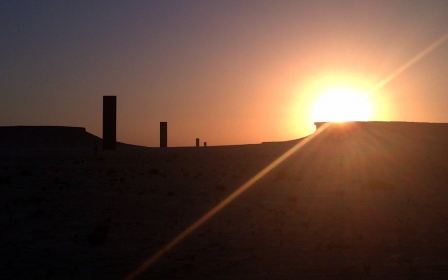Istanbul canvases full of Syrian hopes and dreams
Istanbul, Turkey - These days, every stroke of Zolfiqar Shaarani’s brush on a canvas is accompanied by a sense of gratitude. He is simply grateful to be able to continue doing what he loves.
This wasn’t the case a year ago when he lived in his hometown of Damascus. He was set upon by a group of people dressed in plainclothes, who beat him up viciously.
“When I look back, the incredible thing is that I was trying to protect my hands while leaving my head and face exposed to their blows. This is how much I feared not being able to paint again,” says Zolfiqar.
That assault was the final straw that convinced Zolfiqar that he had no other option but to leave Syria until conditions improved in his war-ravaged country. In late 2014 he managed to find passage on a vessel that was sailing to the Turkish port of Mersin. From there he travelled to Istanbul, his intended destination.
In a dark place psychologically, he wasn’t sure if he would get the opportunity to paint again. This is where an initiative called Arthere Istanbul, the brainchild of Omar Berakdar, another Syrian émigré, came to his rescue.
Multipurpose arts centre
Berakdar, also from Damascus, came to Istanbul in 2012 mainly worried for the future of his 10-year-old child. He says he didn’t want his child to grow up in a climate where the prevailing mindset was “speak out at the risk of death”.
A chemist by training and an avid photographer and artist, Berakdar decided to open a place that would simultaneously serve as a studio for his compatriots unable to find a space to work, while also attempting to change prevailing perceptions about Syrians, mainly formed through media images showing the destitution and desperation of his fellow countrymen.
In December 2014, Berakdar opened the doors to Arthere Istanbul. It is a combination of art gallery, studio and cafe. Loathe to seek outside funding lest it result in pressure to pick a political line and restrict artist participation, Berakdar struck upon the idea of involving all artists to also help create a menu where they can provide a glimpse into their culinary culture as well.
“This is a new concept for all of us. I wanted to create a space where my fellow Syrian artists could continue their work and also to present a different image of Syrians to Turks,” says Berakdar.
“The idea is for us Syrians and Turks and anyone else to get to know each other. We want to show that not all Syrians are charity cases and we want to be productive and give back to the communities we live in.”
Berakdar, however, is keen to ensure that the focus on Arthere Istanbul is not because it was established and is run by Syrians per se, but on them as artists and regular people.
“We don’t put emphasis on the Syrian aspect. We want our project to be known for its art and our atmosphere. The fact that we are Syrian comes later and that will manifest itself anyway.”
Word of mouth
Zolfiqar had heard about such a project from some of his artist friends in Syria but had forgotten about it during his travails. A few weeks after reaching Istanbul he remembered and sought out Berakdar.
“It was amazing when I spoke to Omar. His vision was exactly what I would have dreamed of doing as well. And here all of a sudden was my chance to paint again,” says Zolfiqar.
Zolfiqar says not only has Arthere Istanbul allowed him to paint again but it has also been a huge help in overcoming the mood of darkness that he feared might seep into his work.
“All this affected me badly psychologically and of course it could impact my work but my beliefs and my ideas have proved stronger than the fear,” says Zolfiqar.
Zolfiqar says while the future still seems like it is enveloped in a dense fog, he is desperate to do what he can for his parents and siblings in Syria and his fellow compatriots elsewhere. He says Arthere Istanbul is a project that has lent him a helping hand and he would love to see it continue to grow and expand.
“I would like to help my family and other compatriots. I am trying to in my own way, as an artist.”
An unexpected bonus and education
Toufik Hamidi had just graduated from Aleppo University’s faculty of fine arts in 2012 when he decided that his immediate future lay outside his country.
He grabbed the first opportunity that came his way and went to Saudi Arabia. He worked at an art gallery there before deciding to move to Istanbul.
“Life was actually easier in Saudi Arabia because the same language was spoken and there was more money. But it is a difficult place for a single young man so I decided to come to Istanbul,” says Toufik.
He came to Istanbul in 2014 and spent a few months just wandering around the city aimlessly.
“I don’t speak the language so I couldn’t do much but just wander around. Then I heard of Arthere Istanbul and it changed everything.”
He now both paints and lives on the premises of Arthere Istanbul.
“It is great. I can paint while also getting the chance to discuss many things with the other artists here. I also help out with the cafe like everyone else,” says Toufik.
Toufik says he is currently very happy with his life and feels very fortunate, especially when he sees the struggles his fellow compatriots face in trying to reach Europe.
“Those scenes are very sad. I actually had the chance to go to Europe when it was much easier but I wanted to stay here. I would like to travel to Europe someday but just as a visitor and not to stay,” he says.
Bridging cultures
Oyku Dogan, an illustrator, is the Turkish link at Arthere Istanbul. She learned about this project through a friend of Omar’s wife and was immediately besotted with the idea.
“It is a wonderful way to learn about other cultures. This provides us Turks with an opportunity to learn more about our neighbours. We have these mostly false preconceived notions about Syrians and Arabs in general. We think we know all about them but in fact we know very little,” she says.
Dogan says it would have been easy for the project to just hire someone to work in the cafe kitchen but the plan was to involve an artist and create a natural synergy.
“Not only am I learning something new while continuing my drawing. I am also learning about teamwork through our joint efforts in the kitchen. We have our moments though. Sometimes we try to cook something and just end up burning it.”
She says they have been successful in changing perceptions about Syrians through their initiative but admits it will take a lot of time to have a larger impact.
“Just the other day we had a couple of well-heeled ladies walk in and when they learned that many of the artists here are Syrian they expressed shock and said they didn’t realise Syrians could be so normal. I was furious but it just goes to show that there is a lot of work to be done,” says Dogan.
They are already making an impression in their neighbourhood though. Mehmet, who works at a grocery store a couple of streets away from the arts centre, says he sometimes sees some of the Syrian artists and finds them to be very friendly and polite.
“They look happy and get on with their own business. The ones I have seen are nice guys. We keep on hearing that they are all over the country just begging and all that. But these guys are not like that,” says Mehmet.
Dreaming of a Damascus branch
All artists at the centre display their works on the walls and set their own prices. The proceeds from the cafe go toward meeting the expenses associated with the centre. The centre also organises various workshops and other cultural activities like special music nights and furniture-building events.
Berakdar sees Arthere Istanbul as the first step and dreams of the day he can return to Syria and set up an Arthere Damascus branch.
“I would love to see the day when we have the Arthere concept in various cities across the globe and we can all engage in wider cultural exchanges. But most of all I would like to see an Arthere Damascus.”
New MEE newsletter: Jerusalem Dispatch
Sign up to get the latest insights and analysis on Israel-Palestine, alongside Turkey Unpacked and other MEE newsletters
Middle East Eye delivers independent and unrivalled coverage and analysis of the Middle East, North Africa and beyond. To learn more about republishing this content and the associated fees, please fill out this form. More about MEE can be found here.


